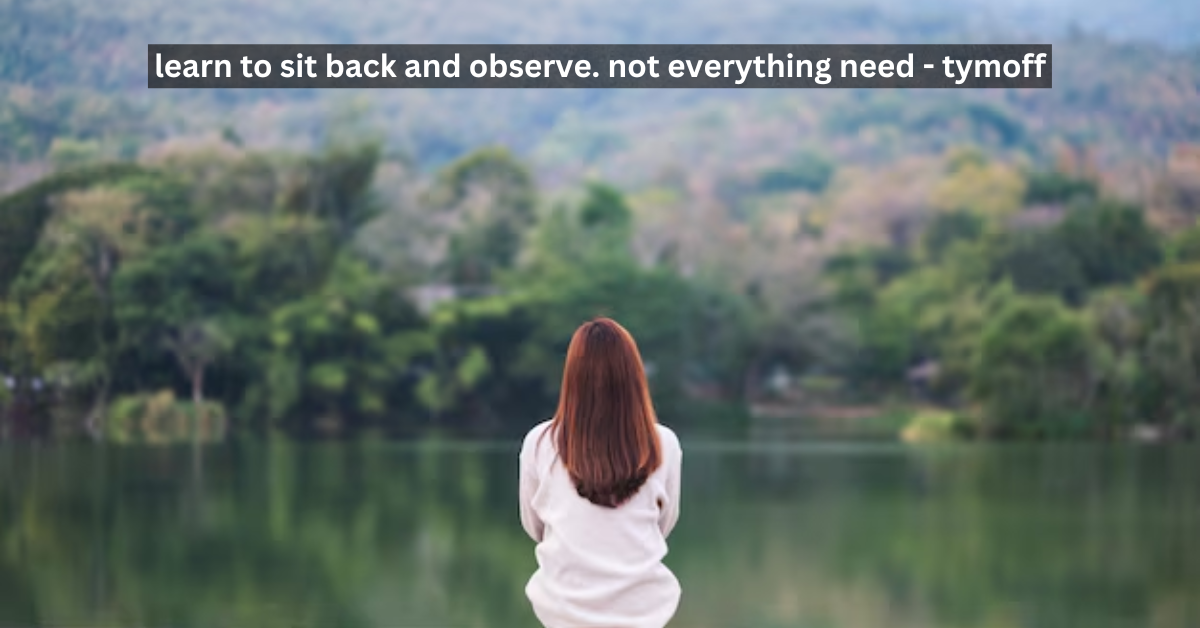In today’s fast-paced world, where instant reactions and quick decisions often dominate our interactions, the concept of “learn to sit back and observe. not everything need – tymoff” offers a refreshing perspective. Rooted in the wisdom of mindfulness and conscious awareness, this mantra encourages individuals to pause, reflect, and observe before responding impulsively. By cultivating the art of observation, we can navigate life’s complexities with clarity, empathy, and resilience.
Mindfulness, at its core, involves being present in the moment without judgment. It enables us to perceive situations more objectively, free from the biases and knee-jerk reactions that often accompany hurried decisions. Observation complements mindfulness by sharpening our awareness of subtle cues, both verbal and non-verbal, that convey deeper meanings in communication and interactions. This combination fosters a deeper connection with ourselves and others, promoting psychological well-being and enriching our social interactions.
Why Observation Matters

The Tendency to React Impulsively
In our evolutionary history, the impulse to react swiftly served as a survival mechanism. However, in today’s context, this reflexive tendency can lead to misunderstandings, conflicts, and increased stress. By learning to pause and observe, we create space for thoughtful responses rather than reactive impulses. This shift empowers us to approach challenges with a calm and collected mindset, enhancing our ability to make informed decisions.
Benefits of Adopting an Observational Approach
Embracing observation yields a multitude of benefits that extend beyond immediate interactions. It cultivates a sense of clarity by allowing us to see situations from different perspectives. This clarity, in turn, reduces stress and promotes mental well-being. Moreover, observing attentively enhances our understanding of other’s emotions and intentions, fostering empathy and strengthening interpersonal connections.
Benefits of Embracing Observation
Reduced Stress and Increased Clarity
In moments of uncertainty or tension, observation acts as a buffer against stress. Instead of getting swept up in the intensity of a situation, taking a step back to observe allows us to assess circumstances more objectively. This heightened clarity enables us to respond thoughtfully, minimizing the impact of stressors and promoting a sense of inner peace.
Enhanced Understanding and Empathy
Observation is a gateway to deeper understanding. By attentively observing others, we pick up on subtle cues such as facial expressions, body language, and tone of voice. These non-verbal signals convey emotions and intentions that words alone may not fully capture. Such insights nurture empathy by enabling us to recognize and respond to others’ feelings with sensitivity and understanding.
Improved Communication Skills
Effective communication hinges on active listening and thoughtful responses. Through observation, we hone our listening skills by focusing not just on words but also on the underlying emotions and context. This attentive listening fosters meaningful exchanges, where individuals feel heard and understood. Moreover, observing communication dynamics in various settings enhances our ability to adapt our message to resonate with different audiences, thereby improving overall communication efficacy.
Development of Emotional Intelligence
Emotional intelligence encompasses self-awareness, self-regulation, empathy, and social skills. Observation plays a pivotal role in developing these facets of emotional intelligence. By observing our own reactions and those of others, we gain insights into emotional triggers, behavioral patterns, and interpersonal dynamics. This self-awareness empowers us to manage emotions effectively, navigate interpersonal relationships skillfully, and make informed decisions aligned with our values and goals.
Cultivation of Patience and Resilience
In a world that values immediacy and quick fixes, observation encourages patience and resilience. It teaches us to embrace moments of uncertainty without rushing to judgment or action. By patiently observing unfolding events, we build resilience to setbacks and challenges, fostering a mindset that thrives on adaptability and perseverance.
You May Also Like: How I Sleep at Night Knowing I’m Failing All My CL – Tymoff
Practical Techniques for Effective Observation

Active Listening Strategies
Active listening goes beyond hearing; it involves fully engaging with the speaker’s message and emotions. Key strategies include maintaining eye contact, paraphrasing to confirm understanding, and asking clarifying questions. These techniques demonstrate genuine interest and encourage open dialogue, laying the foundation for meaningful interactions based on mutual respect and understanding.
Developing a Reflective Mindset
Reflection enhances observation by deepening our understanding of experiences and interactions. Journaling is a powerful tool for reflection, providing a structured outlet to capture thoughts, emotions, and insights gained through observation. By regularly reviewing journal entries, we identify recurring patterns, track personal growth, and refine our observational skills over time.
Recognizing and Interpreting Nonverbal Cues
Nonverbal communication constitutes a significant portion of human interaction, conveying nuanced messages that words alone may not convey. Observing gestures, facial expressions, posture, and vocal tone enriches our understanding of others’ emotions and intentions. This heightened awareness enables us to respond with empathy and adapt our communication style to align with the emotional tone of a conversation.
Using Journaling for Self-Reflection
Journaling serves as a reflective practice to deepen self-awareness and integrate observational insights into daily life. Prompts such as describing observed interactions, identifying personal reactions, and noting areas for growth enhance the effectiveness of journaling as a self-reflection tool. By documenting observations and insights systematically, we cultivate a habit of mindfulness and continuously refine our observational skills.
Applying Observation in Different Contexts
Work Environment: Team Dynamics, Leadership Styles
Observation enhances workplace dynamics by facilitating insights into team interactions and leadership approaches. By observing team dynamics, we discern communication patterns, collaboration strengths, and areas for improvement. This awareness fosters a cohesive team culture built on mutual respect and effective communication. Moreover, observing leadership styles enables us to recognize effective leadership qualities and contribute positively to organizational goals.
Personal Relationships: Enhancing Communication, Building Trust
In personal relationships, observation nurtures deeper connections and fosters trust. Attentively observing loved ones’ verbal and nonverbal cues communicates care and empathy. This relational awareness strengthens bonds by validating emotions, fostering open communication, and resolving conflicts constructively. By prioritizing observation in relationships, we cultivate mutual understanding and support, creating a foundation of trust and intimacy.
Conflict Resolution: De-escalation Techniques, Finding Common Ground
Conflict resolution relies on constructive dialogue and empathetic understanding. Observation plays a crucial role in de-escalating conflicts by identifying underlying emotions and perspectives. By observing conflict dynamics impartially, we uncover shared interests and pathways to resolution. This observational approach promotes collaborative problem-solving, where conflicting parties engage in dialogue based on mutual respect and a shared commitment to finding common ground.
Self-Development: Identifying Personal Triggers, Promoting Growth
Self-development hinges on self-awareness and intentional growth. Observation enables us to identify personal triggers, habitual responses, and areas for personal improvement. By observing our thoughts, emotions, and behaviors with curiosity and non-judgment, we cultivate a growth-oriented mindset. This self-reflective practice empowers us to break free from limiting patterns, embrace change, and pursue personal goals aligned with our values and aspirations.
The Ripple Effect of Observation

Enhanced Communication and Empathy
Observation enhances communication by fostering active listening and empathetic understanding. As individuals practice mindful observation, they develop a deeper appreciation for others’ perspectives and emotions. This empathetic awareness enriches interpersonal communication, where mutual respect and empathy form the bedrock of meaningful connections. By valuing observation in communication, individuals contribute to a culture of empathy and inclusivity, creating positive ripple effects in their social circles and communities.
Building Stronger Relationships
Strong relationships are built on trust, understanding, and mutual support. Observation strengthens relationships by promoting relational awareness and responsiveness. By observing loved ones’ needs, emotions, and communication preferences, individuals demonstrate care and empathy. This relational attentiveness fosters deep bonds based on trust and emotional intimacy. Moreover, by prioritizing observation in relationships, individuals cultivate resilient connections that withstand challenges and nurture personal growth.
Cultivating a Culture of Understanding and Support
Observation contributes to a culture of understanding by encouraging active listening and respectful dialogue. In diverse settings, such as workplaces and communities, observational skills promote inclusivity and appreciation for differing perspectives. By observing social dynamics and cultural nuances, individuals foster an environment where diverse voices are heard and valued. This cultural awareness builds bridges of understanding, fostering collaboration and collective problem-solving.
Contributing to a Mindful and Empathetic Society
At a societal level, observation catalyzes positive change by promoting mindfulness and empathy. As individuals prioritize observation in their interactions and decision-making, they inspire others to embrace mindful practices. This ripple effect fosters a compassionate society where empathy, respect, and collaboration thrive. By championing observation as a cornerstone of social responsibility, individuals contribute to a more harmonious and equitable world.
Frequently Asked Questions
What does “learn to sit back and observe. not everything need – tymoff” mean?
This phrase encourages mindfulness and restraint in reacting impulsively. It suggests taking a step back to observe situations before responding, promoting thoughtful engagement and deeper understanding.
How can observation reduce stress in daily life?
Observation allows individuals to approach situations with clarity and calmness. By observing before reacting, one can avoid knee-jerk responses that often contribute to stress, fostering a more balanced and composed mindset.
What are some practical tips for improving observational skills?
Practice active listening, notice non-verbal cues, and journal reflections regularly. These techniques enhance observational abilities, helping individuals perceive subtle details and nuances in interactions.
How does observation contribute to personal growth?
Observational skills facilitate self-awareness and empathy, key components of emotional intelligence. By observing oneself and others, individuals gain insights into behaviors, emotions, and interpersonal dynamics, fostering personal development and resilience.
In what contexts can observation be particularly beneficial?
Observation is valuable in various contexts, including workplace dynamics, personal relationships, conflict resolution, and self-development. It promotes effective communication, builds stronger connections, and fosters a culture of understanding and empathy.
Conclusion
“Learn to sit back and observe. not everything need – tymoff” embodies a transformative mindset rooted in mindfulness, empathy, and resilience. By embracing observation, individuals cultivate clarity in decision-making, deepen interpersonal connections, and foster personal growth. The benefits of observation extend beyond individual well-being to encompass enhanced communication, conflict resolution, and societal harmony. As we integrate observational practices into our daily lives, we empower ourselves and others to navigate challenges with compassion and insight. Let us embark on this journey of self-discovery and positive change, one mindful observation at a time.
Stay in touch to get more updates & alerts on Picnob! Thank you



